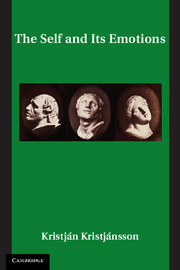Book contents
- Frontmatter
- Contents
- List of Tables
- Acknowledgments
- 1 Introduction
- 2 What Selves Are
- 3 Exploring Selves
- 4 The Emotional Self
- 5 Self-Concept: Self-Esteem and Self-Confidence
- 6 The Self As Moral Character
- 7 Self-Respect
- 8 Multicultural Selves
- 9 Self-Pathologies
- 10 Self-Change and Self-Education
- References
- Index
- Titles in the series
1 - Introduction
Published online by Cambridge University Press: 05 May 2010
- Frontmatter
- Contents
- List of Tables
- Acknowledgments
- 1 Introduction
- 2 What Selves Are
- 3 Exploring Selves
- 4 The Emotional Self
- 5 Self-Concept: Self-Esteem and Self-Confidence
- 6 The Self As Moral Character
- 7 Self-Respect
- 8 Multicultural Selves
- 9 Self-Pathologies
- 10 Self-Change and Self-Education
- References
- Index
- Titles in the series
Summary
The Age of the Self
On the Oprah Winfrey show, whenever something has not gone right for her guests (all of whom, by the way, seem to live in a world where it never rains, but pours), the hostess tells them they must be lacking in self-esteem. A much-read self-help manual asserts that self-disesteem lies at the bottom of all conceivable personal and social ills, ranging from excessive masturbation to serial killings. When the life of the socialite and ‘it girl’, Paris Hilton – famously famous for being famous – hit a moral low and media high with her probation violation in 2007, flaming debates raged on Weblogs addressing the kind of self-concept she projected. ‘Hedonistic’, with 95,000 entries, was a narrow winner over ‘postmodern’, with 85,700 entries, for the ‘Hiltonistic’ self-concept. In the wake of the decision of Mohammed Sidique Khan and his three friends to pack a rucksack full of explosives and destroy the lives of 52 innocent people on the London underground, whole conferences were devoted to the issue of the irreconcilable multicultural self-images that had torn asunder the rational selves of these four men. According to the analysis of eminent German Professor of Culture and Pedagogy, Thomas Ziehe (virtually unknown in the Anglo-Saxon world, unfortunately), subjectivisation of the self is the major characteristic of today's young in the West. ‘That is how I see it’ has become a dead end: a no-go area for educators.
- Type
- Chapter
- Information
- The Self and its Emotions , pp. 1 - 24Publisher: Cambridge University PressPrint publication year: 2010



